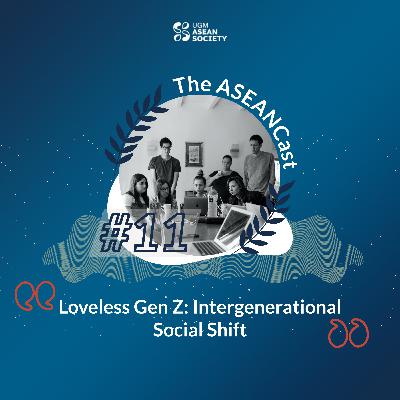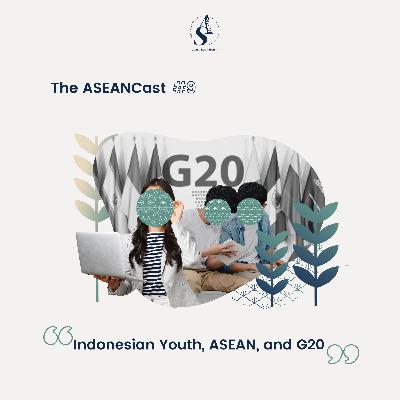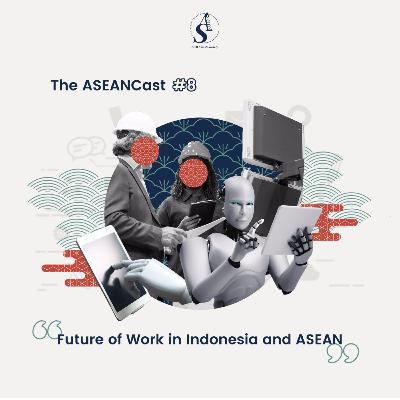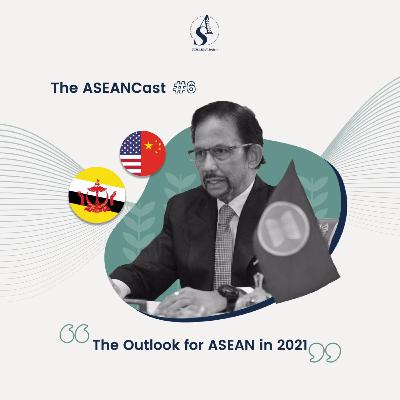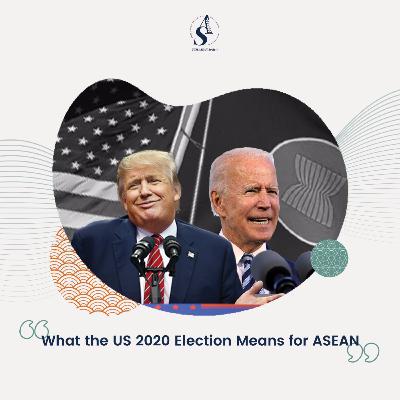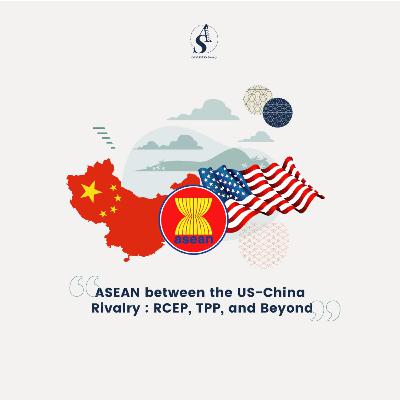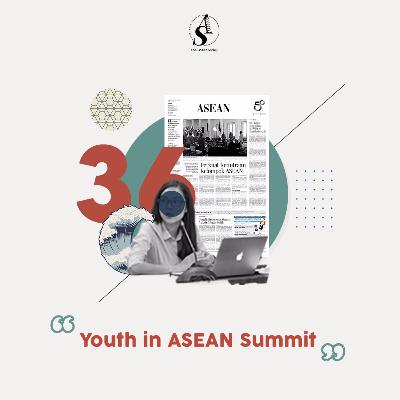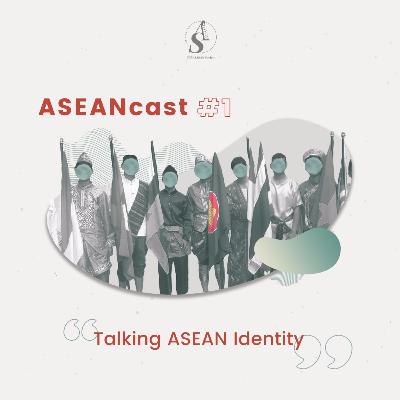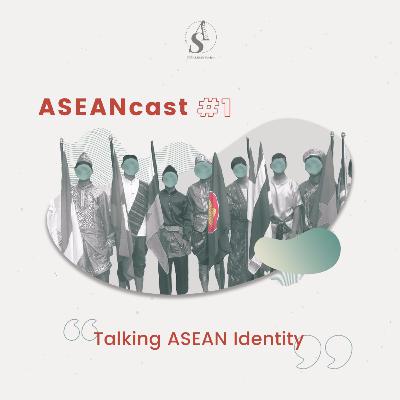Discover The ASEANcast
The ASEANcast

21 Episodes
Reverse
On one hand, gig economy opens up many opportunities. But on the other hand, it raises important questions. Who benefits the most? Do workers have control? How are they protected? What role does the state and the law have in ensuring social justice amid this disruption?Watch the full episode! We're uncovering ASEAN, one conversation at a time.
In this podcast, we discuss the intersection of popular internet trends and youth culture across ASEAN. The conversation highlighted the regional nuances, digital connectivity, and the role of social media in fostering a shared yet diverse cultural landscape among ASEAN youth.
Stay tuned on our online platform for more information and updates!
In this podcast, we discuss how to deal with various anxieties that exist amidst the world's unfavorable geopolitical situation in building the foundation for the ASEAN 2045 vision to increase regional resilience. Furthermore, we discuss how Indonesia must try to ensure that previously agreed agendas remain the attention of ASEAN and are implemented in 2024. Thus, let's find out how to develop the diplomatic strategies and techniques that are more effective through this podcast episode!
Embarking on a captivating journey through the Transnasionalist Pop Culture in ASEAN, one unveils a rich tapestry woven from the threads of diverse influences. Across the Southeast Asian landscape, a dynamic convergence of traditions, contemporary expressions, and global trends creates a unique regional identity that transcends borders. The pulse of this cultural phenomenon beats connects communities and fosters a sense of shared experiences. As the vibrant hues of traditional artistry intertwine with the modern rhythms of globalized entertainment, Transnasionalist Pop Culture emerges as a reflection of the region's resilience and adaptability.
Discussing about pop culture, fashion, memes, and culinary, this fourteenth episode is not to be missed!
ASEAN's interconnected culture unites the diversity of the region. Rich traditions blend through shared heritage, arts, and cuisine. From the vibrant colors of Batik in Indonesia to the elegance of Thai classical dance, cultural exchange thrives. Language variations bridge gaps, fostering understanding and cooperation. ASEAN embraces its cultural tapestry, fostering unity and harmony.
In the thirteenth episode of the ASEANCast, the group discussion delve on the role of culture within the ASEAN countries and its interconnetion.
Dewasa ini, teknologi pendidikan sering dikaitkan dengan tren inovasi platform pembelajaran daring atau ed-tech startup. Di pasar Asia Tenggara, investasi ed-tech telah mendapatkan daya tarik dalam beberapa tahun terakhir, yaitu mencapai US$18,66 miliar pada 2019. Hantaman Covid-19 bahkan secara dramatis mempercepat permintaan akan kemampuan ed-tech.
Akan tetapi, saat ini ed-tech startup mengalami PHK besar-besaran yang disinyalir sebagai akibat dari fenomena ledakan gelembung atau bubble burst, seperti yang terjadi di Indonesia. Penyebab fenomena tersebut diantaranya adalah pasar yang oversaturated, kesulitan pendanaan, dan lain sebagainya. Lantas, apakah teknologi pendidikan sesungguhnya membawa manfaat sebagaimana pendidikan konvensional? Sejauh mana teknologi pendidikan dapat membentuk dan mempengaruhi pendidikan ASEAN di masa depan? Simak selengkapnya dalam podcast berikut!
Dewasa ini, teknologi pendidikan sering dikaitkan dengan tren inovasi platform pembelajaran daring atau ed-tech startup. Di pasar Asia Tenggara, investasi ed-tech telah mendapatkan daya tarik dalam beberapa tahun terakhir, yaitu mencapai US$18,66 miliar pada 2019. Hantaman Covid-19 bahkan secara dramatis mempercepat permintaan akan kemampuan ed-tech.
Akan tetapi, saat ini ed-tech startup mengalami PHK besar-besaran yang disinyalir sebagai akibat dari fenomena ledakan gelembung atau bubble burst, seperti yang terjadi di Indonesia. Penyebab fenomena tersebut diantaranya adalah pasar yang oversaturated, kesulitan pendanaan, dan lain sebagainya. Lantas, apakah teknologi pendidikan sesungguhnya membawa manfaat sebagaimana pendidikan konvensional? Sejauh mana teknologi pendidikan dapat membentuk dan mempengaruhi pendidikan ASEAN di masa depan? Simak selengkapnya dalam podcast berikut!
Gen Z adalah generasi yang berbeda dari generasi-generasi sebelumnya (Thach et al., 2021). Gen Z memiliki harapan, preferensi, dan perspektif kerja yang berbeda serta dinilai menantang bagi organisasi. Karakter Gen Z lebih beragam, bersifat global, serta memberikan pengaruh pada budaya dan sikap masyarakat kebanyakan. Satu hal yang menonjol, Gen Z mampu memanfaatkan perubahan teknologi dalam berbagai sendi kehidupan mereka. Teknologi mereka gunakan sama alaminya layaknya mereka bernafas (Jenkins, 2020). Karakter digital natives yang Gen-Z punya ini mempunyai banyak kelebihan dan kekurangan. Kelebihannya adalah mereka bisa mengakses informasi yang ada di ujung jari mereka sehingga hal ini memungkinkan Gen Z untuk memperluas pengetahuan mereka dan proaktif dalam pembelajaran mereka. Namun, di sisi lain, kekurangan dari generasi ini adalah mereka menghabiskan terlalu banyak screentime sehingga dapat menimbulkan perasaan terisolasi dan keterampilan sosial yang kurang berkembang (Peltzer & Pengpid, 2017).
Menurut penelitian yang pernah dilakukan di 7 negara ASEAN, 7,8% remaja melaporkan sebagian besar atau selalu merasa kesepian dan 31,3% melaporkan terkadang merasa kesepian dalam 12 bulan terakhir. Setelah disesuaikan dengan faktor sosiodemografi dan dukungan sosial, ditemukan bahwa kesepian dikaitkan dengan kesehatan mental yang buruk, penggunaan narkoba, agresi, dan perilaku berisiko kesehatan lainnya. Rasa kesepian ini menyebabkan Gen Z semakin sulit untuk mencintai dirinya sendiri dan membangun hubungan yang bermakna dengan orang lain, termasuk hubungan dengan keluarga, teman, komunitas, atau orang lain.
Berangkat dari latar belakang tersebut, UGM ASEAN Society sebagai sebuah organisasi kemahasiswaan di Universitas Gadjah Mada, bermaksud mengundang Octavia Putri Tjajadi - Psikolog Klinis Anak dan Remaja untuk menjelaskan lebih dalam mengenai perubahan drastis terkait perilaku dan kebiasaan Gen Z dalam bergaul dan berinteraksi dengan sesama dan aplikasi cara untuk menghadapi masalah tersebut.
Lingkungan sebagai aset utama manusia dalam menopang kehidupannya di Bumi telah mengalami banyak perubahan di sepanjang perkembangan peradaban manusia. Namun, perubahan yang terjadi semakin hari semakin memprihatinkan. Mengutip dari laporan Food and Agriculture Organization (FAO), Bumi kehilangan sekitar 10 juta hektare hutan setiap tahunnya di seluruh dunia. Fakta tersebut menunjukkan bahwa Bumi dalam keadaan tidak baik. Oleh karena itu, perlu adanya upaya yang kita lakukan untuk menjaga kelestarian lingkungan. Akan tetapi, bagi sebagian besar negara berkembang, termasuk negara-negara ASEAN, menjaga kelestarian lingkungan seringkali berbenturan dengan kepentingan pertumbuhan ekonominya.
Strategi yang dapat mengimbangkan kedua pilihan tersebut menjadi sangat penting untuk diterapkan. Salah satu strategi yang dapat diterapkan adalah ekonomi sirkular. Ekonomi sirkular adalah suatu konsep baru dalam dunia industri yang berfokus pada proses 3R (reduce, reuse, dan recycle). Konsep ekonomi sirkular menjadi salah satu strategi yang sangat mungkin untuk diimplementasikan guna menjaga kelestarian ekosistem dan mendorong pertumbuhan perekonomian nasional.
Berangkat dari latar belakang tersebut, UGM ASEAN Society sebagai sebuah organisasi kemahasiswaan di Universitas Gadjah Mada, bermaksud mengundang Bapak Gumilang Aryo Sahadewo sebagai Wakil Dekan Fakultas Ekonomika dan Bisnis, Universitas Gadjah Mada, sebagai pembicara pada episode The ASEANcast kali ini.
As the only ASEAN country at the G20, Indonesia plays a very pivotal role in advocating for not only its own interest, but also the interest of ASEAN countries as well as other developing countries. In October, G20 leaders will meet to discuss world's most pressing issues. In the lead up to the G20 Summit 2021, youth across the G20 met in July 2021 after about six months of intense negotiation.
In this ninth episode of The ASEANcast, we conversed with Puteri Komarudin, Caroline "Dea" Tasirin, and Angelo Wijaya as the delegates of Indonesia to the Y20 Summit 2021 Italy.
According to Dell Technologies (2018), 85% of jobs that will exist in 2030 have not even been invented yet today. The Fourth Industrial Revolution will continue to shift the landscape of work in the years to come. How should we prepare for it? What approach should governments choose to create a better ecosystem for our future workforce?
In this eighth episode of The ASEANcast, we conversed with Ms. Reti Sudarto, a program and project management expert as well as a workforce strategist at the International Labour Organization (ILO). She is an expert in the field of future of work. She can be reached through Instagram @ladyreti and LinkedIn at Reti Sudarto. She manages a personal website, which can be found at www.ladyreti.com.
About one year after the COVID-19 pandemic hits the Southeast Asian region, some countries are still grappling with the best method to deal with the pandemic. Despite the fact that some countries have rolled out their vaccination strategy, some challenges remain, one of them is vaccine safety. The role of ASEAN in facing the pandemic as well as ASEAN's preparedness for other challenges is very interesting to discuss.
In this seventh episode of The ASEANcast, we conversed with Muhammad Habib Abiyan Dzakwan, a researcher at the Disaster Management Research Unit at the Jakarta-based Centre for Strategic and International Studies (CSIS), who is currently pursuing a master's degree in International Relations at the School of Advanced International Studies, The Johns Hopkins University in Washington, D.C.
ASEAN cooperation faced unprecedented challenges in 2020, with the COVID-19 pandemic sweeping across the globe, the US-China tension intensifying, and an increasingly uncertain global political landscape. In 2021, the outlook for our world is slightly brighter, with the COVID-19 vaccines rolled out in some countries, a new president in the White House, and a renewed commitment for multilateralism after a turbulent four years of Donald Trump's presidency.
In this sixth episode of The ASEANcast, we conversed with Shofwan Choiruzzad, PhD, a lecturer at the Department of International Relations at Universitas Indonesia, who is also the Executive Secretary of the ASEAN Studies Center (ASC) at Universitas Indonesia, to understand the world revolving ASEAN in 2021.
The recent US election has shown a clear result - Joseph Robinette Biden Jr. won. Will Southeast Asia and the world welcome America back? Maybe this recent election brings new hope to us all after a turbulent four years of Donald Trump's administration. Or maybe not.
We conversed with Evan Laksmana, PhD, a senior researcher at the Department of International Relations, Centre for Strategic and International Studies (CSIS) Indonesia, to find out more.
In this fifth episode of The ASEANcast, we managed to snitch Dr. Evan Laksmana's critical view and assessment of what Biden's win means to Southeast Asia, the Asia-Pacific, and the world.
The US-China rivalry has inevitably put ASEAN in a difficult yet interesting situation. The Asia-Pacific, or rather, the Indo-Pacific region is home to world's most vibrant economies and trade links. Geographically located between the US and China, the Indo-Pacific region gave birth to a number of free trade arrangements in recent years, like the Trans Pacific Partnership (TPP) and the Regional Comprehensive Economic Partnership (RCEP). With the departure of US from the TPP, the grouping of TPP-11 moved forward with the Comprehensive and Progressive Agreement on the Trans Pacific Partnership (CPTPP). The rising tension between the US and China is now presenting ASEAN and its neighbors with challenges and opportunities.
In this fourth episode of The ASEANcast, we conversed with Rocky Intan, a researcher at the Department of International Relations, Centre for Strategic and International Studies (CSIS) Indonesia.
The South China Sea dispute is one of the most serious security challenges for ASEAN and its members today. Despite decades-long negotiation, there is no resolution in sight yet.
We talk to Aristyo Darmawan, a lecturer in International Law at the Faculty of Law, Universitas Indonesia, to get the latest update and new insights as to what is happening as well as the most recent development in the South China Sea.
In this third episode, we dive deep into what is the core of the issue and what options are available on the table — we also do not forget to ask what are the ramifications of this dispute to ASEAN and to Indonesia.
Youth plays a pivotal role in ASEAN. The participation of youth in decision-making process in ASEAN-level is becoming more important than ever.
In this episode, we converse with Angga Dwi Martha, the representative of Indonesian youth in the 36th ASEAN Summit’s Youth Interface with ASEAN Leaders.
We discussed the role of youth in ASEAN as well as ASEAN’s most pressing issues that were discussed during the event, such as youth volunteerism, entrepreneurship, and skills that are required to face the fourth industrial revolution.
In this episode of The ASEANcast, Aisha Rasyidilla Kusumasomantri (also known as Aira), a lecturer at the Department of International Relations from Universitas Indonesia, talks about ASEAN Identity, its relevance to the youths, and its impact on the future decision-making of ASEAN. This episode is a series of three fascinating subtopics related to the title of this episode.
In part 3, Aira converses with us about her “proposal” to the ASEAN Identity. She mentions three key points that ASEAN could consider. In addition, she talks about how ASEAN Identity relates to ASEAN’s position vis-a-vis China’s Belt and Road Initiative and America’s Indo-Pacific Strategy.
In this episode of The ASEANcast, Aisha Rasyidilla Kusumasomantri (also known as Aira), a lecturer at the Department of International Relations from Universitas Indonesia, talks about ASEAN Identity, its relevance to the youths, and its impact on the future decision-making of ASEAN. This episode is a series of three fascinating subtopics related to the title of this episode.
In part 2, Aira unravels how International Relations theories and perspectives see the ASEAN Identity building, the process of ASEAN Identity building thus far, and how youth can contribute to this process.
In this episode of The ASEANcast, Aisha Rasyidilla Kusumasomantri (also known as Aira), a lecturer at the Department of International Relations from Universitas Indonesia, talks about ASEAN Identity, its relevance to the youths, and its impact on the future decision-making of ASEAN. This episode is a series of three fascinating subtopics related to the title of this episode.
In part 1, Aira explains what is ASEAN Identity, her insights on identity and how ASEAN Identity is now being brought to the spotlight once again after several years of unspeedy progress.




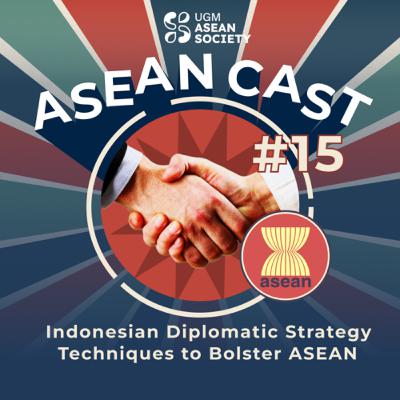

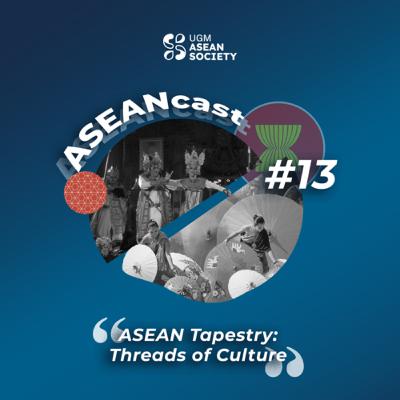
![Episode 12: Shaping the Future of ASEAN through the Advancement of Education Technology [part 2] Episode 12: Shaping the Future of ASEAN through the Advancement of Education Technology [part 2]](https://s3.castbox.fm/89/b6/4a/3f21e0970cbc16c085cb27958dc15f95b5_scaled_v1_400.jpg)
